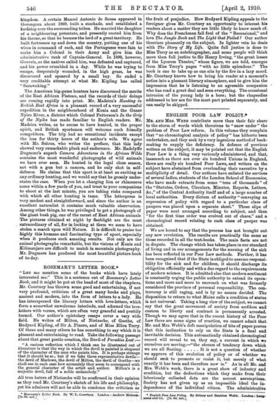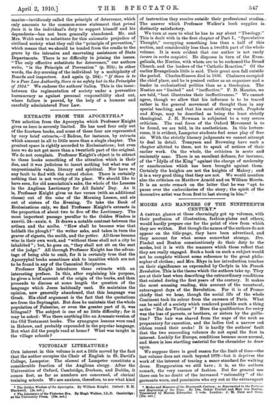ENGLISH POOR LAW POLICY.*
Mn. AND Mits. WEBB contribute more than their fair share to the storm of words which threatens to "snow under" the problem of Poor Law reform. In this volume they complain that "no chronological analysis of policy" has hitherto been undertaken, and they seek by a very ingenious method of book- making to supply the deficiency. In defence of previous writers on the subject, it may be pointed out that the English Poor Law is a thing very variously administered, and that, inasmuch as there are over six hundred Unions in England, there are really six hundred Poor Laws, and writers on the subject have abstained from overloading their narrative by a multiplicity of detail. Our authors have enlisted the services of several ladies, students of the London School of Economics, who have made extracts from some "tens of thousands" of the "Statutes, Orders, Circulars, Minutes, Reports, Letters, of the Central Authority itself and of a large number of local authorities. Every dictum of authority "conveying an expression of policy with regard to a particular class of paupers was placed upon a separate sheet." These slips of paper were next arranged according to subject, and then "for the first time order was evolved out of chaos," and a chronological record relating to each class of pauper was obtained.
We are bound to say that the process has not brought out any new revelation. The results are practically the same as those recorded in all the text-books. The main facts are not in dispute. The change which has taken place in our standard of living and in our arrangements for the nursing of the sick has been reflected in our Poor Law methods. Farther, it has been recognised that if the State is obliged to assume responsi- bility for the sick and for children, it should discharge its obligation efficiently and with a due regard to the requirements of modern science. It is admitted also that modern sentiment is constantly urging the public authority to extend its opera- tions and more and more to encroach on what was formerly considered the province of personal responsibility. The con- troversy is still raging, and is by no means decided. The disposition to return to what Maine calls a condition of status is not universal. Taking a long view of the subject, we cannot say that the great movement of society from serfdom and custom to liberty and contract is permanently arrested. Though we may agree that in the recent history of the Poor Law there are some signs of reaction, we cannot admit that Mr. and Mrs. Webb's deft manipulation of bite of paper proves that this inclination to rely on the State is a final and inevitable decision. This automatically obtained chronological record will reveal to us, they say, a current in which we ourselves are moving,—" the stream of tendency down which
we are all floating It is not a question of whether we approve of this evolution of policy or of whether we should seek to promote or resist it, but merely of what exactly it has been and therefore now is." As in all Mr. and Mrs. Webb's work, there is a great show of industry and
erudition, but the deductions which they make from their laboriously collected data are the merest assumptions. Society has not given up as an impossible ideal the in- dependence of the individual citizen. The administrative • English Poor Law Policy. By Sidney and Beatrioe Webb. London: Long- man, and Co. [7s. 6d. net.]
maxim—invidiously called the principle of deterrence, which only amounts to the common-sense statement that prinui facie it is the individual's duty to support himself and his dependents—has not been generally abandoned. Mr. and Mrs. Webb seek to substitute for this axiomatic prejudice of civilised society what they call the "principle of prevention," which means that we should be tended from the cradle to the grave by the intrusive and enervating assistance of State Departments. There is no difficulty in joining the issues. "The only effective substitute for deterrence," our authors write, "is the Principle of Prevention" (p. 315); in other words, the dry-nursing of the individual by a multiplicity of Boards and inspectors. And again (p. 284): "If there is to be a Poor Law Authority, there is no safety but in the Principles of 1834." We endorse the authors' italics. This is the issue : between the regimentation of society under a preventive bureaucracy as against personal responsibility eked out, where failure is proved, by the help of a humane and carefully administered Poor Law.











































 Previous page
Previous page